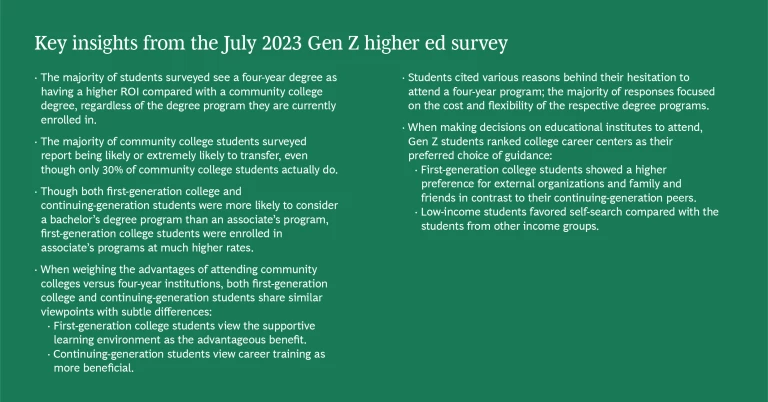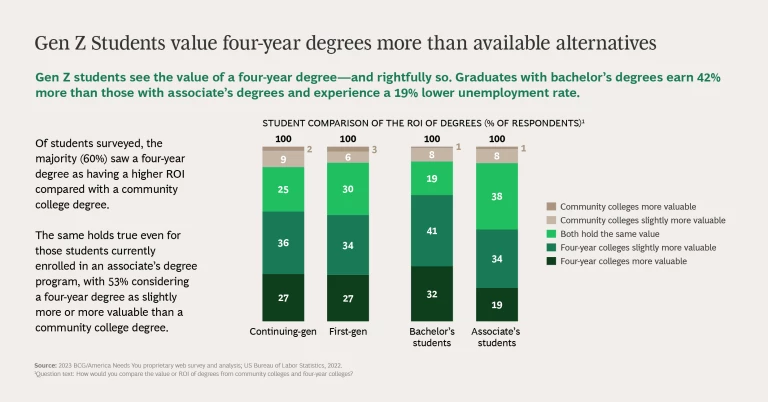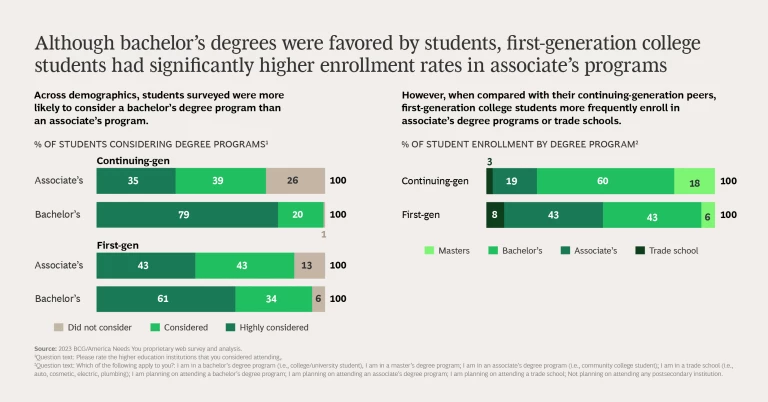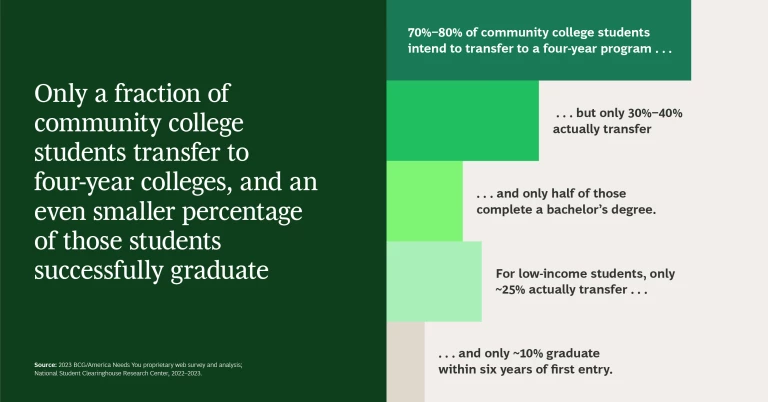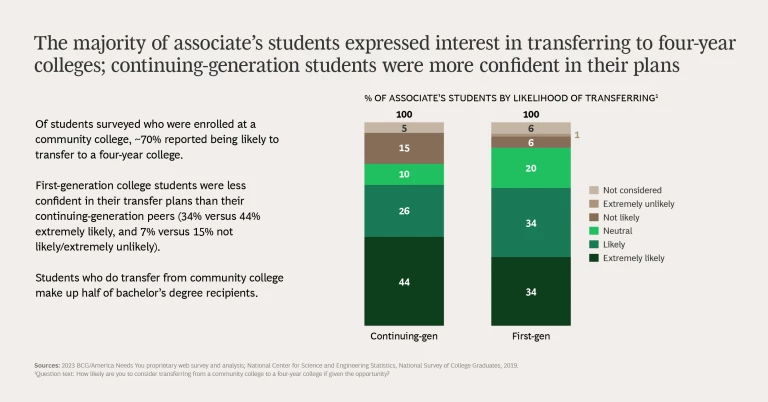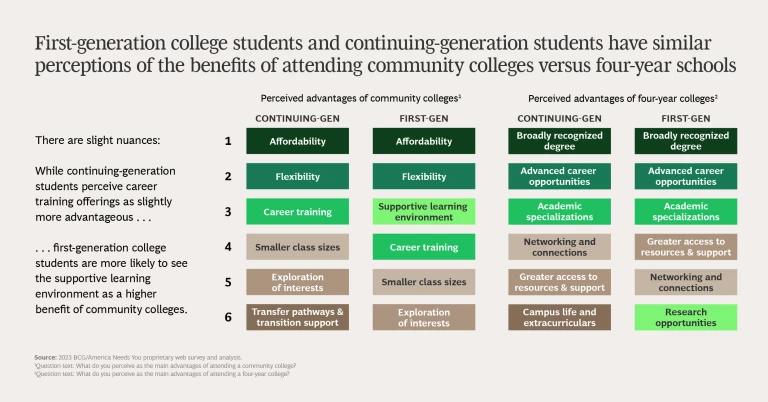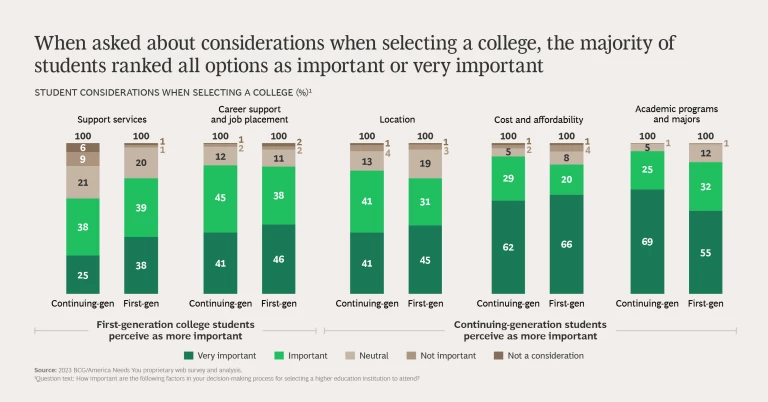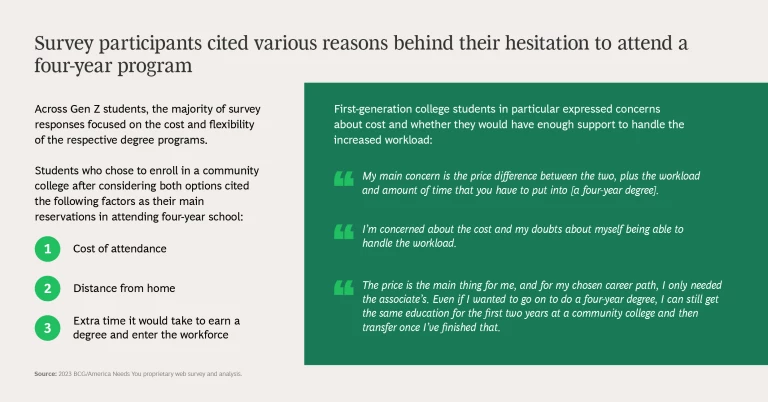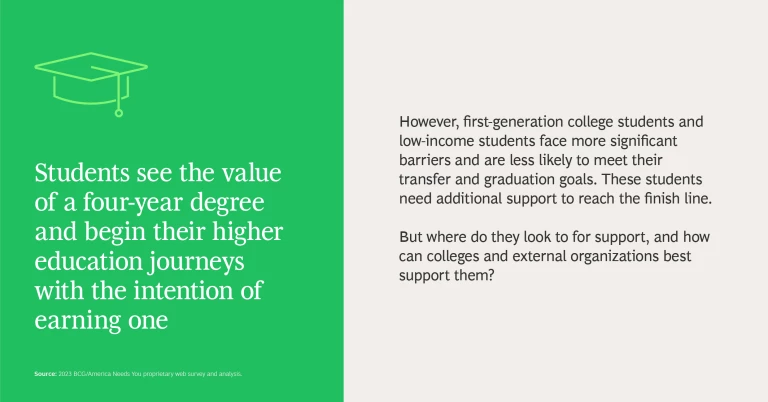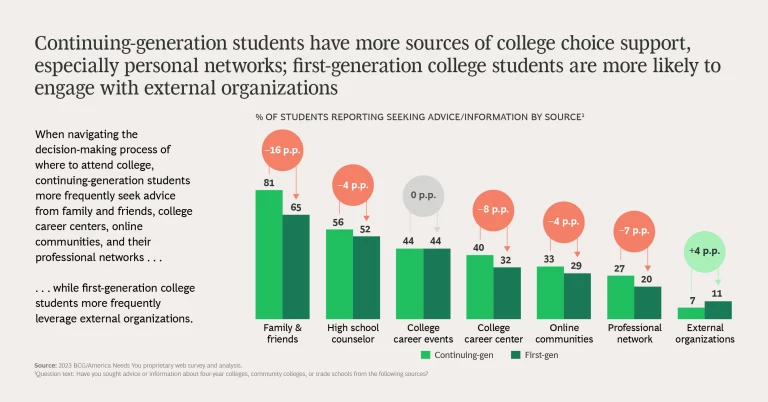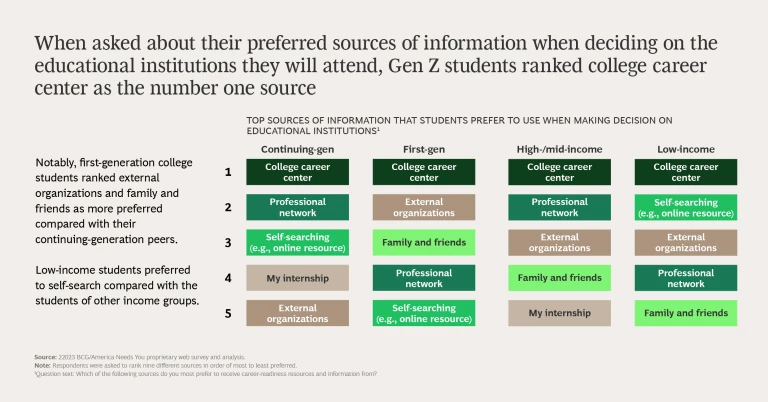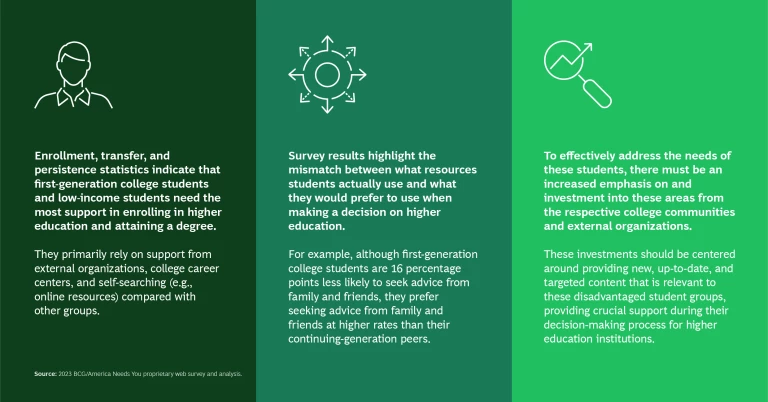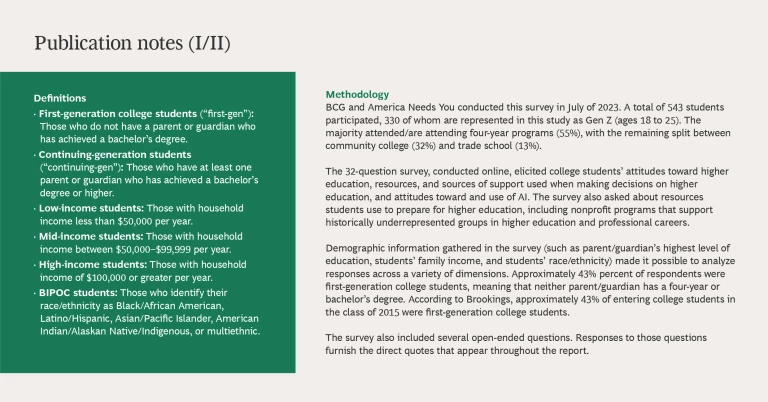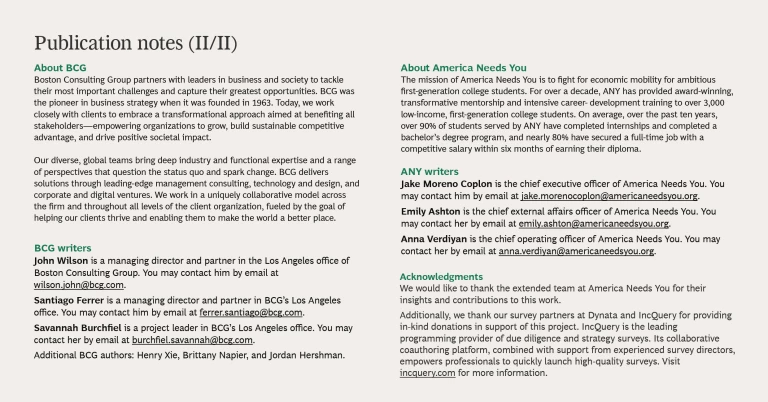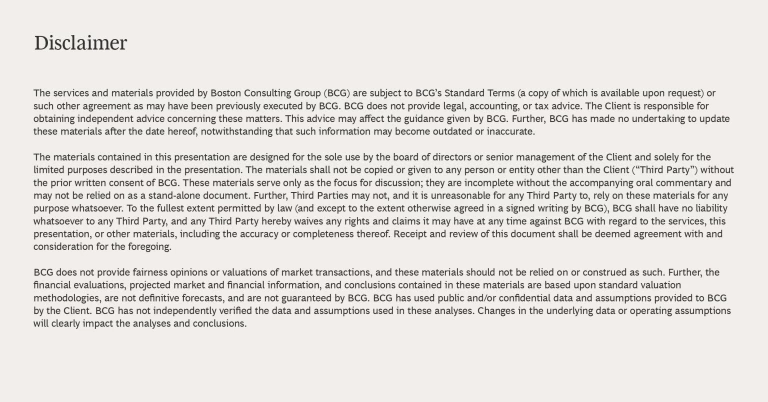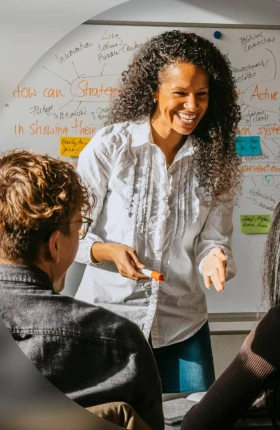This content was produced in collaboration with America Needs You.
The impact of AI on the future of work has been the focus of countless conversations, classes, and articles over the past year. But understanding its impact on the future of higher education for Gen Z and beyond is also important. According to a recent BCG survey of about 300 Gen Z college students, higher education needs to incorporate AI in two critical ways: as a tool to support and instruct students, particularly low-income and first-generation college students during their college careers and as part of the curriculum so students are more attractive to employers and prepared to use AI in their work lives. (See the slideshow.)
Not surprisingly, Gen-Zers are broadly aware of AI. A June 2023 Picnic survey found that 83% of this demographic know what AI is, and 78% have used it. Despite this awareness, however, their use of AI beyond ChatGPT remains limited, as is their grasp of how AI can improve their learning experience. It’s critical that higher education institutions improve students’ understanding of AI and work to ensure that AI benefits are shared equitably and not concentrated among the more well-resourced institutions and the most well-connected students.
Higher education needs to incorporate AI as a tool to support and instruct students and as part of the curriculum so students are more prepared to use AI in their work lives.
Addressing Disparities and Resource Gaps
Over the past decade, college enrollment has fallen slightly across all sectors, with the steepest declines at public two-year
These gaps extend to AI, with better-funded and more selective institutions hiring AI faculty, developing AI curriculum, and exploring AI capabilities to support their student populations and prepare them for the future of work. For example, MIT committed $1 billion to create the Schwarzman College of Computing, where students can pursue a bachelor’s degree in Artificial Intelligence and Decision Making. Meanwhile, schools such as Stanford and Georgia Tech are exploring ways to incorporate AI into the teaching process, using AI-generated feedback to improve instruction and developing AI teaching assistants to support faculty.
Making the resourcing problem even worse for cash-strapped institutions is the extreme shortage of computer science faculty, spurred in part by high demand and rising salaries in the private
These issues threaten to increase skill disparities between graduates of more- and less-well-resourced schools. But this outcome is not inevitable. With creative thinking, it’s possible to deploy AI in ways that could actually reduce disparities.
Enhanced Internal Resources
The partnership between Georgia State University and Mainstay (a platform designed to boost enrollment, retention, and well-being) demonstrates how AI can be used to support students during their academic careers. In 2016, GSU and Mainstay first partnered to develop a 24-7 virtual admissions assistant that provided students with timely access to information, support, and encouragement.
The tool was particularly helpful for first-generation college students and Pell-eligible students, who sent an average of 9% and 32% more messages, respectively, to the chatbot than the general population. As a result of the initiative, GSU reduced “summer melt”—the phenomenon in which students enroll during the spring but fail to attend in the fall—by 21.4% and boosted overall enrollment by
In 2022, inspired by the success of the first initiative, GSU and Mainstay partnered again to introduce a virtual teaching assistant for some large lectures and classes with low pass rates. The teaching assistant improved student performance, increasing the probability of receiving a B or higher by 16% among all students. Among first-generation college students, it helped increase final grades by 11 points.
Tactical AI tools designed to boost retention, persistence, and academic performance can improve outcomes and break down barriers for students from underrepresented backgrounds. In the words of Dr. Russell Shilling, an EdTech researcher, “AI brings educational technology to an inflection point. We can either increase disparities or shrink them, depending on what we do
Tactical AI tools designed to boost retention, persistence, and academic performance can improve outcomes and break down barriers for students from underrepresented backgrounds.
Improving Career Preparedness
Currently, students find AI-specific resources for career preparedness less helpful than general career preparedness supports. Only 29% of respondents reported that their institution’s offerings on “AI disruptions in hiring” were helpful or very helpful, compared with the 70% who said their school’s “support applying to jobs/internships” was helpful or very helpful (see Exhibit 1).
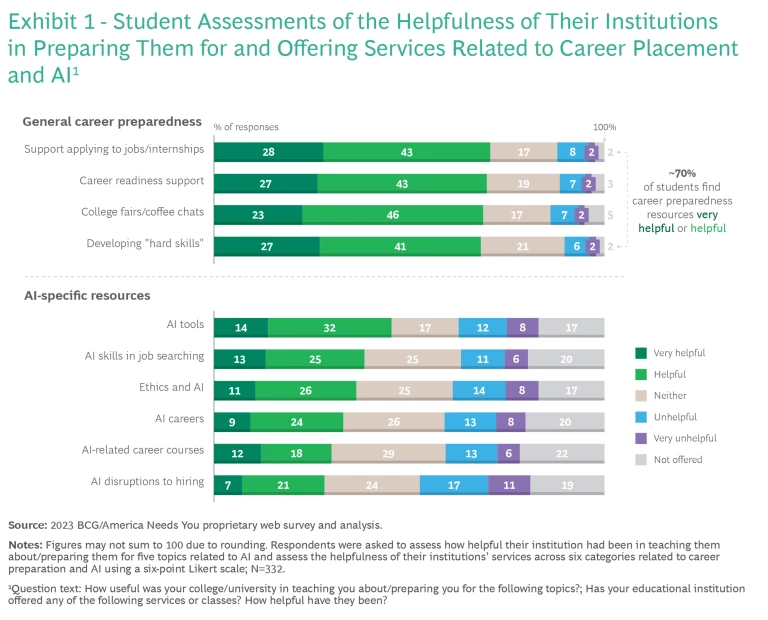
Even so, students expressed a desire for their institutions to offer more guidance as they prepare for careers impacted by AI. Gen Z students across demographics emphasized a few common categories, including the ethics of AI, applications of AI to their personal lives (e.g., time management), interview readiness, and the impact on career paths. One respondent noted, “Educational institutions should prepare students for both positive and negative impacts of AI, as well as educating people on AI ethics.” Another added, “I think ethics should play a big role because we don’t necessarily know what AI will be able to do in the future, but we can always consider the moral implications of it.”
Respondents also expressed concerns about how AI would impact their ability to get and keep a job. One student said, “I think that educational institutions should, at the least, prepare students for the interview process that now involves AI at some places.” Another commented, “Institutions should focus on teaching students skill sets in their career field that AI is less likely to dominate in the near future.”
Gen Z students desire guidance in the ethics of AI, applications of AI to their personal lives, interview readiness, and the impact on career paths.
Views on Future Careers
Despite these concerns around career preparedness, students were generally positive about the influence of AI on the job market for their generation. More disadvantaged groups, however, tended to be less sanguine. (see Exhibit 2).
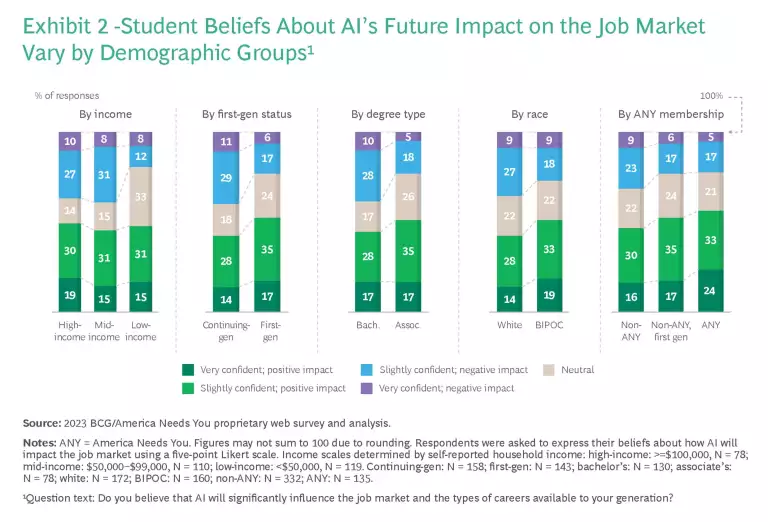
Broken out by field of study, students studying business/entrepreneurship, technical fields, and STEM were the most positive about the benefits of AI to their fields, while students in social studies, arts and design, and media and communications had a more negative outlook (see Exhibit 3).
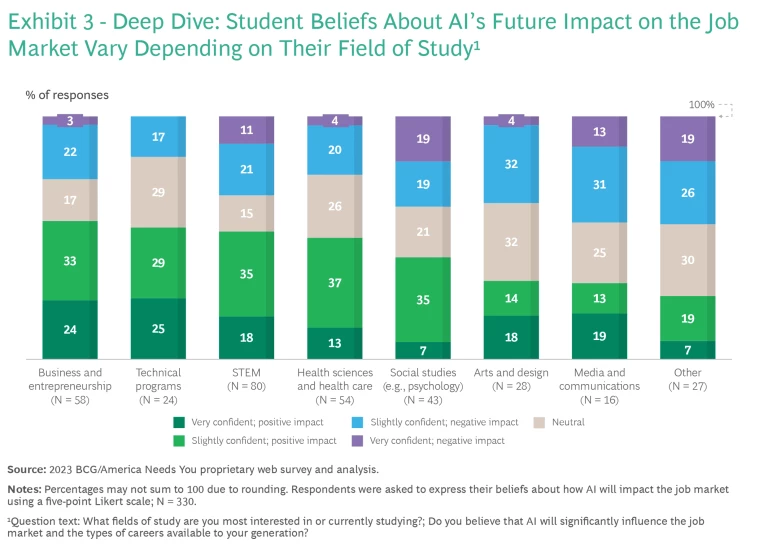
Regardless of whether they had a positive or negative outlook, students typically agreed that STEM, marketing, and media industries would see the biggest impact from AI (see Exhibit 4).
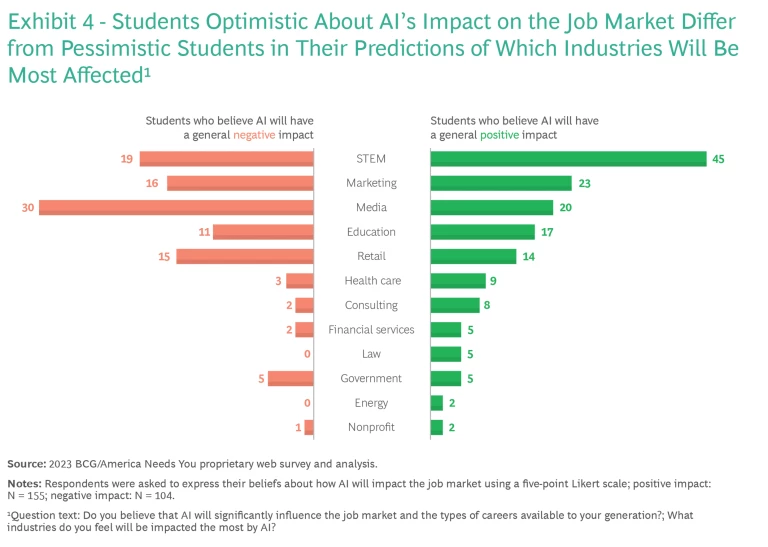
Leveling the Playing Field
To leverage AI in ways that benefit all students and help level the playing field, higher educational institutions, employers, and support organizations all have a part to play. Specifically, we recommend the following actions.
Higher education institutions should:
- Invest in more AI tools. These can improve student outcomes and the college’s bottom line by increasing persistence and graduation rates at a relatively low cost to the institution. For example, AI chatbots are already proving effective at providing students information and thus improving their confidence to continue with their studies. These chatbots are especially powerful for first-generation college students whose network of family and friends usually aren’t a good resource for this information. Also, AI-backed search engines can help students with self-directed searches, which many low-income students prefer, even more so than students from other income groups.
- Partner between institutions. Less well-resourced institutions may have difficulty adapting their curriculums and investing in the latest AI tools. Better-resourced schools can help to lessen disparities by partnering with other colleges to share knowledge and resources. The evolution of AI also allows for better feedback loops to identify disparities, close gaps, and develop strategies that consider demographics, cultures, and regions.
Employers should:
- Partner with colleges. Workers of the future will need to use AI tools. To improve their preparedness, employers should work alongside educational institutions to provide access and training on the tools they expect their companies will use. Furthermore, by partnering with and investing in less-resourced colleges, employers can widen the pool of applicants armed with the skillsets they need. Here again, AI driven feedback loops can continually improve outcomes.
Support organizations should:
- Offer AI support and training tools. Students at less-well-resourced colleges may not have access to AI tools and curriculum. External support organizations—for example, education- and career-focused nonprofits—can help close this gap. Furthermore, disadvantaged students often lack other sources of support, such as family and friends, knowledgeable about education and career paths. AI tools from support organizations can offer advice, encouragement, and resources.
AI will not solve every challenge that students and institutions face in the coming years, but it is sure to play a big role in improving college and career success. It’s imperative that these benefits are shared equitably and not concentrated among the more well-resourced institutions and the most well-connected students. Partnerships and investments to promote accessibility and provide tactical solutions to the challenges faced by under-resourced schools and underprivileged students can help narrow gaps both between and within institutions.


